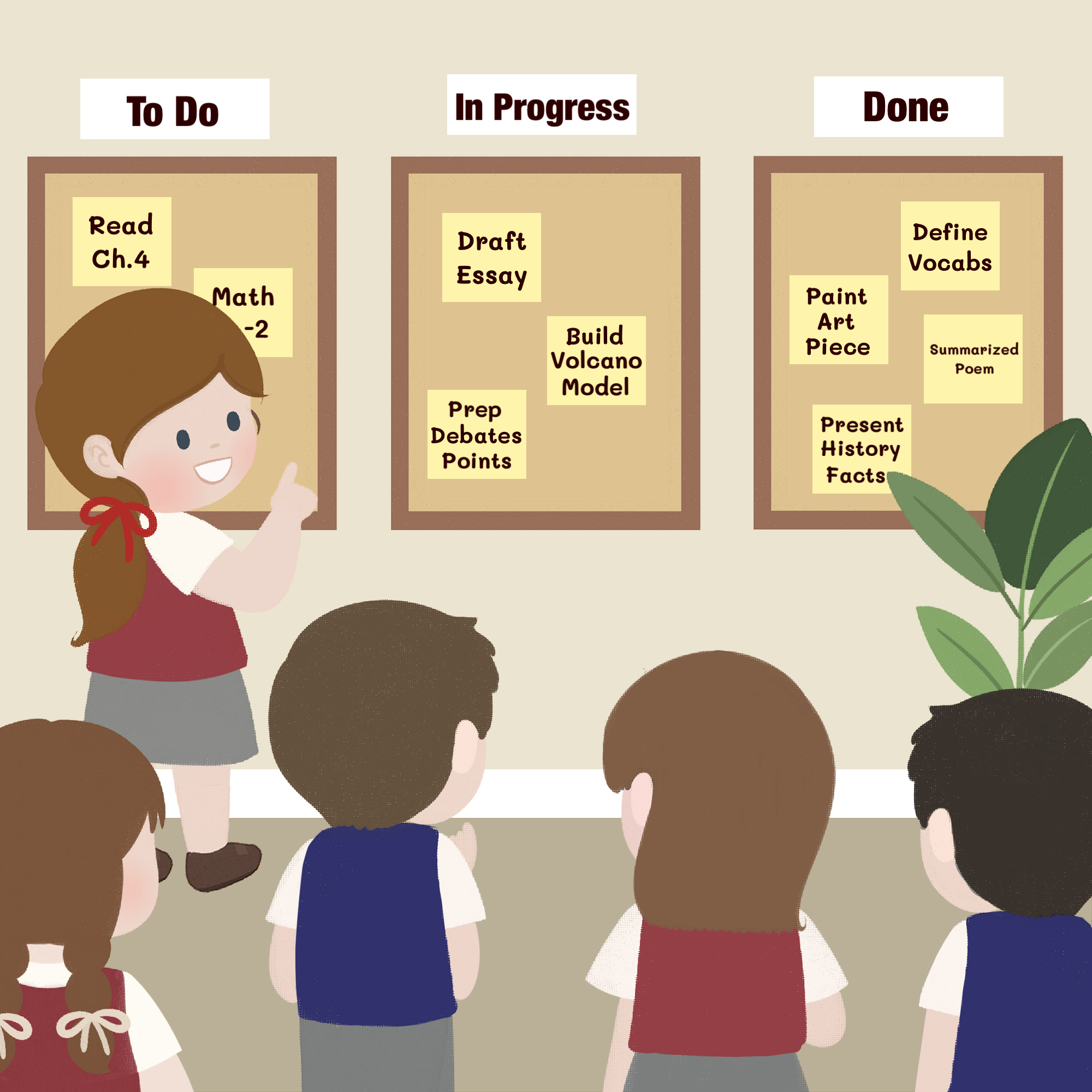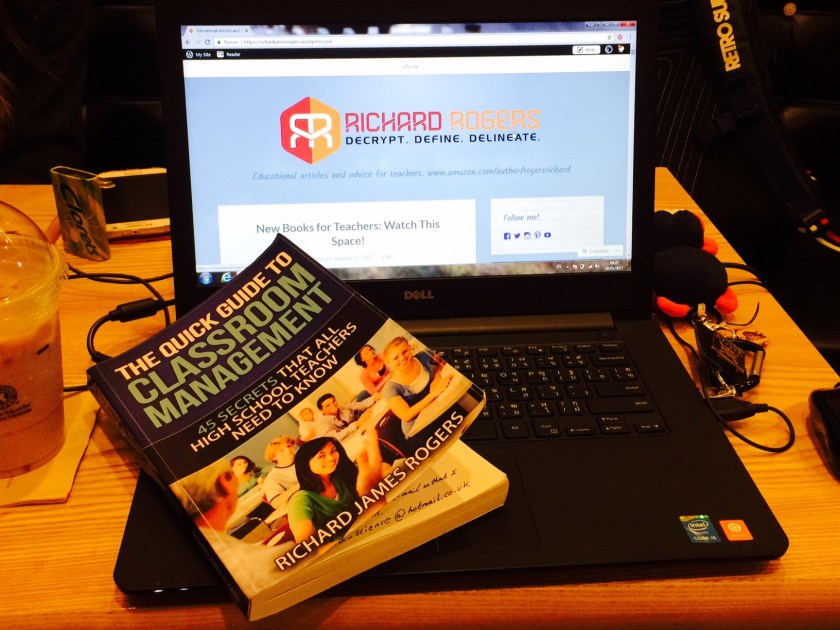An article by Richard James Rogers (Award-Winning Author of The Quick Guide to Classroom Management and The Power of Praise: Empowering Students Through Positive Feedback). This blog post has been beautifully illustrated by Pop Sutthiya Lertyongphati.
Accompanying podcast episode:
As a recently designated Certified ScrumMaster®, I thought it would be appropriate for me to share my newly acquired knowledge with my readers – with a particular emphasis on how Scrum can be utilised in the high school classroom, and when managing teams of high school teachers. Scrum is a hugely popular Agile Project Management technique that is most commonly associated with boardrooms, not classrooms! Today I aim to explain why Scrum is an excellent framework for use with any school project, and how the logistics of the system work.
The Student Experience
For students, adopting Scrum is like discovering a secret potion that turbocharges their project work. Here’s how it unfolds:
Project proposal: Picture a brainstorming session where students pitch their project ideas – from building a mini-robot to organizing a charity event. With Scrum, they can form self-organized teams around these ideas, each team with its unique blend of skills and passions.
There are three ‘roles’ that students can choose to play in Scrum:
- Product Owner: Decides which tasks need to be completed as part of the project and clarifies requirements. The Product Owner manages the Product Backlog – prioritizing tasks that require the most attention and keeping track of team progress.
- Scrum Master: Understands Scrum philosophy and facilitates and coordinates the entire process of Scrum.
- Developer: These are the team members who carry out the daily work of creating the parts of the project that the Product Owner decides are the highest priority. Developers are the only team members who MUST attend the Daily Scrum, but the Product Owner and Scrum Master can join too.
Sprints and ‘Increments’: In Scrum, projects are broken down into manageable chunks called sprints – think of them as short, focused bursts of activity. For our high school heroes, this means setting clear goals for each sprint – whether it’s designing a prototype or conducting research – and diving headfirst into action. A sprint should last between 7 – 10 days, ideally (although, officially, a Sprint can last up to four weeks but I don’t recommend this). The objective of the sprint is to produce a useable part of the project, called an ‘increment’. This increment could be a data analysis on Google Sheets, a working model of particular concept, a series of slides, a short video with text, a summary of research conducted, etc.
Daily Scrum (or ‘Standup’): Every day, students gather for quick (no longer than 15 minute) meetings, sharing progress updates, discussing roadblocks (or ‘impediments’), and tweaking their plans accordingly. It’s like having a daily pow-wow to keep everyone on the same page and ensure that nobody gets lost in the shuffle. Of course, you may not teach the students every single day, which is why Scrum teaches them how to collaborate and agree upon a daily meeting place (e.g. the school library).

Feedback and Adaptation: Scrum thrives on feedback loops, and our students are no exception. Whether it’s peer reviews, teacher feedback, or reflections on their own progress, students constantly iterate and refine their work, learning the invaluable art of adaptation along the way. The review part of the Scrum cycle is called the ‘Sprint Review’ and should be conducted at the end of every Sprint. It is a process designed for the team’s benefit, so it may not need to be run as a whole class presentation but rather a group meeting of around 30 minutes.
Showcase and Celebrate: As each sprint concludes, students showcase their achievements – whether it’s a working prototype, a compelling presentation, or a tangible outcome (once again, the outcome is called an ‘increment’). It’s a moment of pride and celebration, reminding them of how far they’ve come and fueling their drive for the next sprint.
Utilising Scrum with teams of teachers
Now, let’s shift gears and zoom in on the teachers – the unsung heroes behind the scenes. The very same Scrum cycle that we use with students can be used with teachers too – the framework doesn’t change. Here’s how Scrum empowers them to lead by example:
Facilitation: As senior teachers lead their teams of educators, they wear the hat of facilitators rather than dictators. They create a safe space for collaboration, encourage open dialogue, and empower their peers to take ownership of their professional development.
Coaching and Support: Just like coaches on the sidelines, senior teachers provide guidance, mentorship, and support to their fellow educators. They help them navigate challenges, sharpen their skills, and unleash their full potential – all while fostering a culture of continuous improvement.

Alignment and Coordination: With multiple projects and initiatives in play, senior teachers use Scrum to align their team’s efforts, coordinate schedules, and maximize productivity. It’s like conducting a symphony orchestra, where every teacher plays their part in perfect harmony.
Adaptability and Innovation: In today’s fast-paced educational landscape, adaptability is key, and Scrum equips senior teachers with the tools to embrace change and drive innovation. They experiment with new teaching methods, incorporate feedback loops, and stay ahead of the curve – all while inspiring their colleagues to do the same.
Celebrating Success: Last but not least, senior teachers celebrate the wins – big and small. Whether it’s a breakthrough in teaching pedagogy or a collaborative project that captivates students, they shine a spotlight on achievements and foster a culture of appreciation and camaraderie.
So there you have it – a glimpse into the magical world where Scrum meets high school, where students become agile innovators and teachers become champions of collaboration. As we continue to explore new frontiers in education, let’s remember that with Scrum, the possibilities are endless – so let’s roll up our sleeves, rally our teams, and embark on this exhilarating adventure together!















































